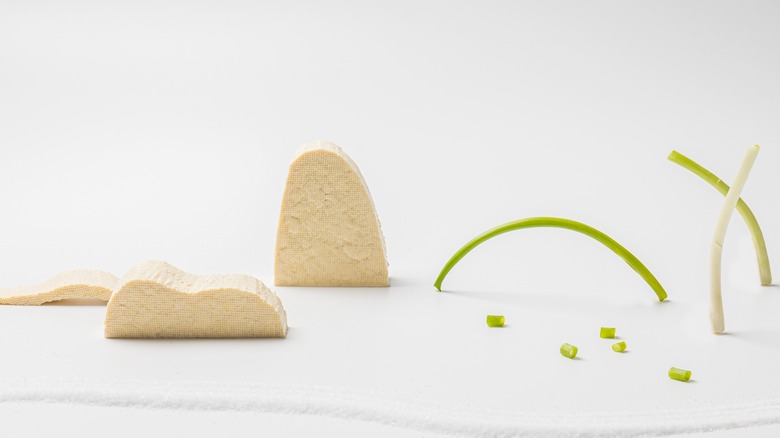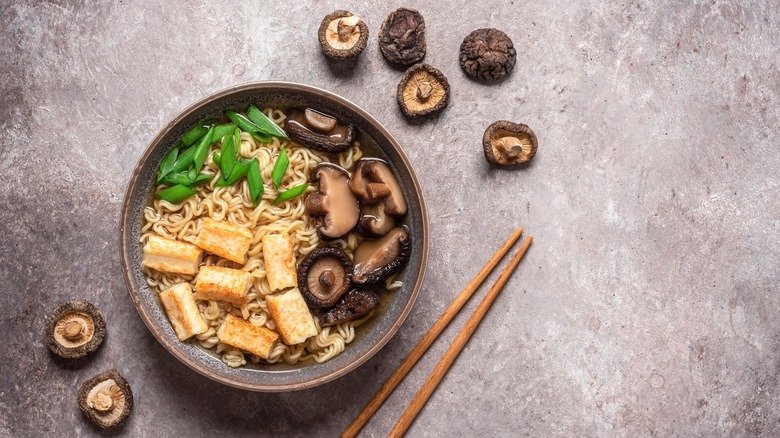What Makes Sprouted Tofu Unique
Tofu has been enjoyed by cultures around the world for generations. The first recorded mention of tofu was in 10th-century China (per FoodPrint). However, Soy Info Center explains that tofu was invented almost by chance hundreds of years before that using something called the Accidental Coagulation Theory.
The Accidental Coagulation Theory suggests that a cook in China in 600 A.D. used unrefined sea salt to season soup containing soy milk. The milk curdled due to the nigari in the salt, and tofu was born. This was a happy accident for tofu lovers around the world, many of whom still use nigari as a coagulant to make tofu today.
Tofu is a big part of vegetarian and vegan diets and is known for being a great source of lean protein. Most of us are familiar with regular tofu, whether it's General Tso's bean curd at your favorite Chinese restaurant or the tofu scramble you see on the breakfast menus at vegan restaurants. But what is sprouted tofu, and what makes it unique?
A nutritional powerhouse
Sprouted tofu is made when soybeans are soaked until green sprouts begin to emerge. They are then used just like unsprouted soybeans to make soy milk, tofu, or any other soy product. What makes sprouted tofu unique is its nutritional value.
According to TofuBud, there are 76 milligrams of calcium in 3 ½ ounces of regular tofu, but the amount of calcium in sprouted tofu is a whopping 235 milligrams. The Mayo Clinic notes that most adults need around 1,000 milligrams of calcium per day, so consuming less than four ounces of sprouted tofu would get you on your way to meeting that recommended amount.
There's more good news about the nutritional value of sprouted tofu, too. Plant-based calcium is more bioavailable than calcium from dairy, meaning it is absorbed more efficiently by your body, per a 2009 report published by the American Journal of Clinical Nutrition. According to the T. Colin Campbell Center for Nutrition Studies, only 32% of the calcium from milk can be used by the human body, compared to 40-64% from foods such as tofu and leafy greens. If you want to increase the amount of calcium your body absorbs, add more greens, tofu, and other soy products to your diet.
Good news about sprouting
Sprouting beans and grains has been proven to boost their nutrition, make them easier to digest, and increase their nutritional value (per Eat Your Way Clean). Phytic acid, which is found in most beans, seeds, nuts, and grains, can reduce your body's ability to absorb iron. But allowing them to sprout can change that, and this science applies to sprouted tofu, too. Sprouted tofu is 56% lower in phytic acid than regular tofu, according to Healthline.
Sprouted tofu isn't likely to turn up at your local supermarket — you may find it at Whole Foods or Trader Joe's — but the good news is that it generally doesn't cost more than the unsprouted variety. Remember that the safest option is to buy only organic, non-GMO sprouted tofu, as genetically modified soybeans can more readily absorb pesticides (per Pacific Standard).
If you already make homemade tofu, then making sprouted tofu should be easy. According to Vegetarian Gourmet Kitchen, in just three days, using simple tools, you can have sprouted beans ready to turn into tofu or soy milk.


